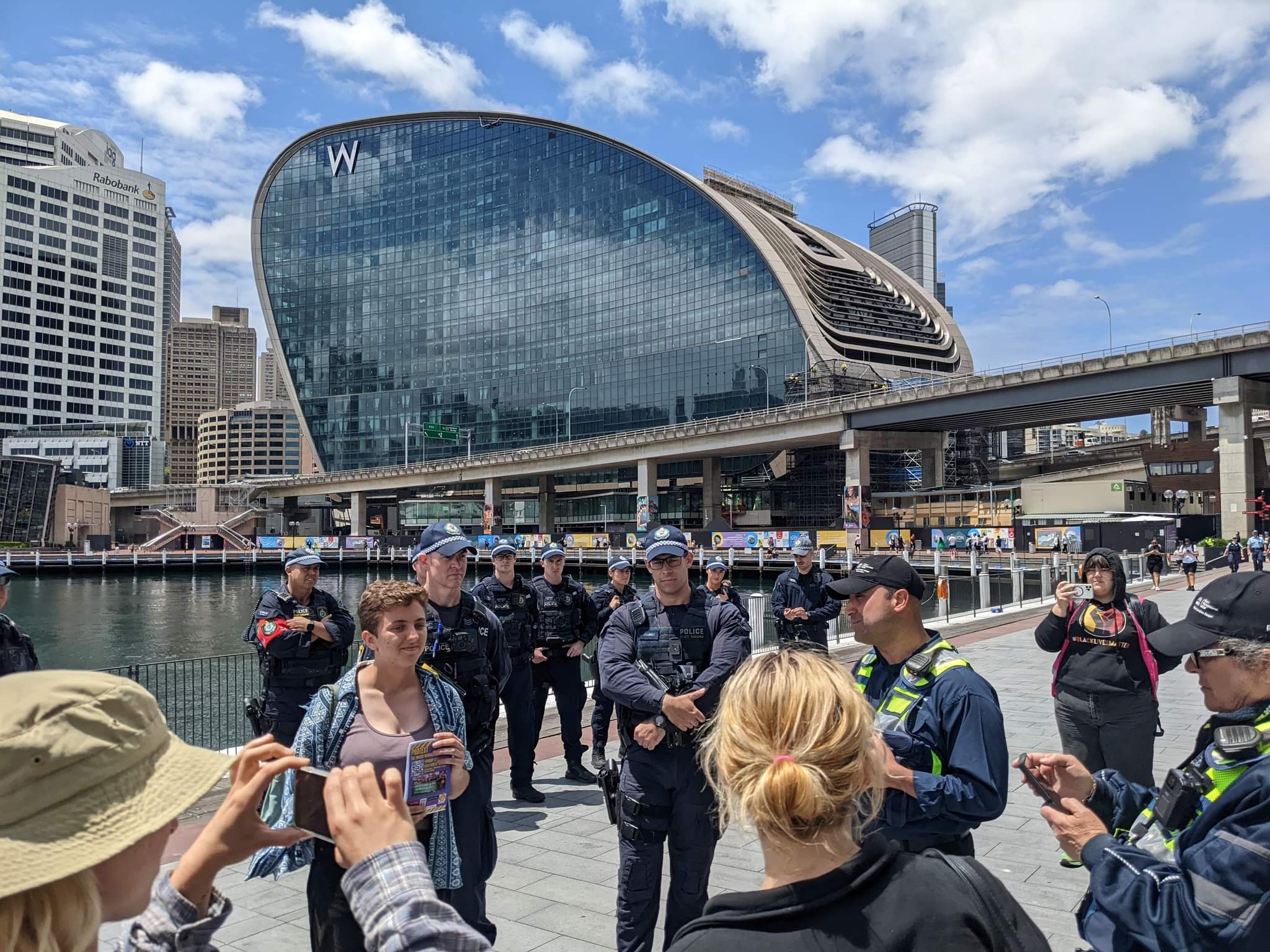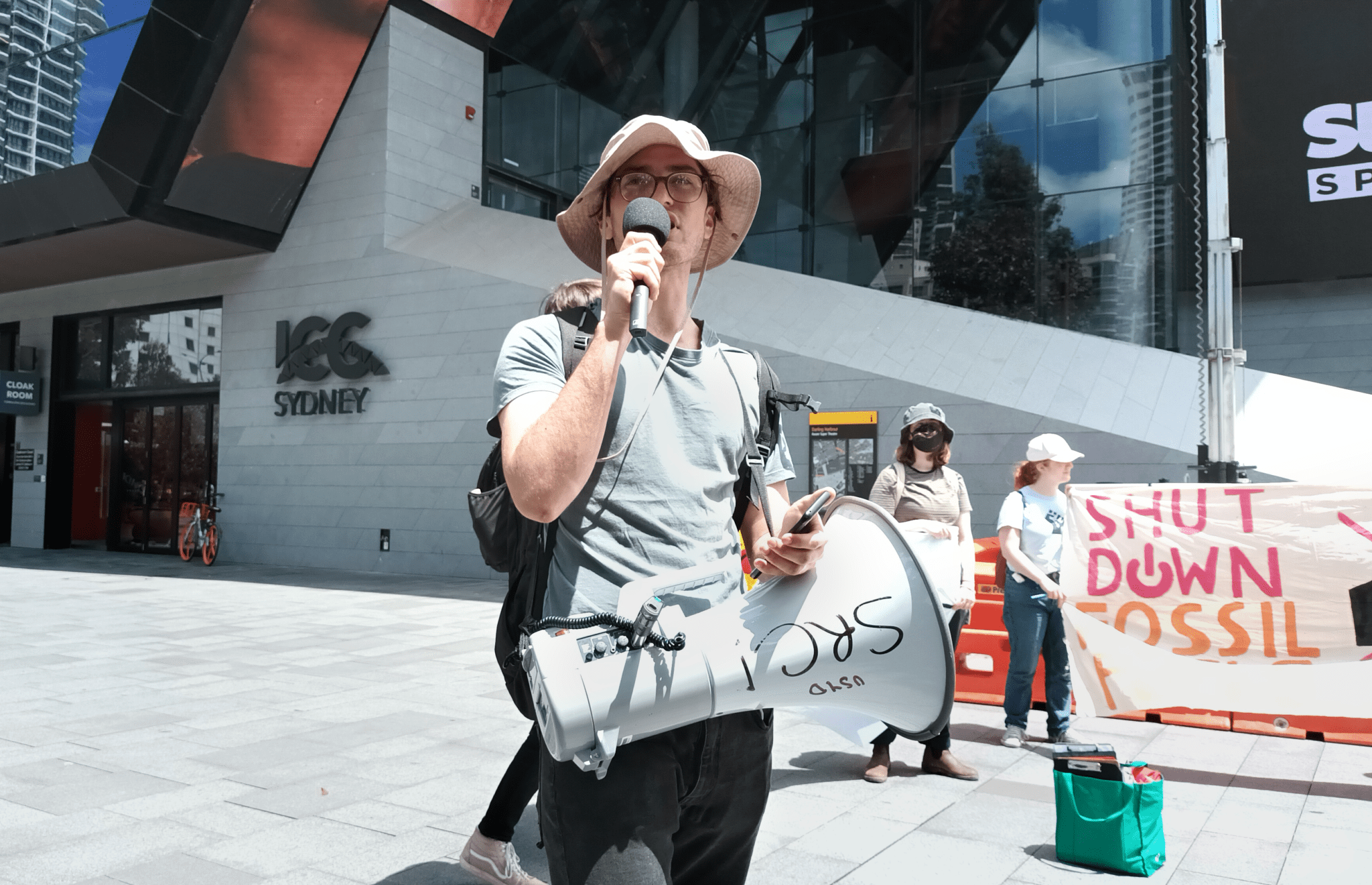Student protesters were threatened with arrest at the International Mining and Resources Conference (IMARC), held this week from 2-4 November. The conference saw representatives of over 800 mining and energy companies, including Adani and BHP meet to discuss the sector.
Uni Students for Climate Justice and the National Union of Students (NUS) rallied outside the International Conference Centre. The area outside the ICC building was heavily guarded with police officers and entry to the building was restricted to conference attendees.
Outside the ICC, students held banners with demands such as ‘Shut Down Fossil Fuels’ and ‘No Uranium Mine at Mulga Rock’, referring to a uranium mine located in Kalgoorlie, Western Australia developed by Vimy Resources. As student protestors gathered outside the ICC, environmental activist and UNSW SRC councillor Gina Elias told the crowd, “Right now, oil companies are expanding. They are making three billion dollars every single day!”
Simon Upitis, the incoming Environment Officer at the USyd SRC Environment Collective, also highlighted the problematic nature of fossil fuel companies.
“Another example of what the ruling class does: absolve any guilt from them, and pretend that they are fixing it, when they are expanding the fossil fuel industry around the world and making it worse.”
Students like Upitis and fellow incoming SRC Environment Officer Maddie Clark also complained about police repression of activists. Clark posted a video on Facebook, stating that she was asked to move on by the police, with a threat of arrest for handing out leaflets at the Darling Harbour area. Clark says in her video: “The people who these cops have decided to target are not the climate criminals (at the ICC) but the student protesters fighting for the planet to be saved. Sydney has just become a police state.”
The police allegedly told Clark she wasn’t allowed to hand out pamphlets and told her to move on from the Darling Harbour precinct, with one officer threatening her with arrest if she didn’t move on. According to Clark, four police officers followed Clark as she left the Darling Harbour precinct. Clark alleges that the police told student protesters that they were not allowed to have a stall outside the ICC, and the protestors initially refused to close the stall. As a result, the protesters had to pack up the stall after four riot cops started to grab material from the stall.

Upitis condemned the heavy handed police response that protesters experienced.
“What a travesty it is, that you can be arrested in Sydney now, for the crime of having a leaflet. The fact that our basic democratic rights are under attack in NSW because this government, the police and mining bosses are all in bed together. It’s absolutely disgusting and we need to protest to stop it.”
Upitis was also threatened with arrest for handing out leaflets, he also explained that climate activists organised the protest to express their anger towards fossil fuel conglomerates at IMARC.
“The people inside the IMARC conference, representatives of Rio Tinto, Chevron and BP and representatives of capitalist governments all around the world should not be able to get together and scheme about how they will screw over the planet for profit in peace…The vast majority of people think we need serious action on climate change.’
According to The Guardian, NSW’s strict anti-protest laws, passed in March, which stipulate that protesters can be fined some $22,000 for blocking roads, rail lines, tunnels, bridges and industrial estates in NSW, might have contributed to IMARC’s decision to relocate from Melbourne to Sydney this year after eight years in Victoria.
The mining industry produces around 4 to 7 per cent of greenhouse gas emissions globally, and coal mining produces around 3 to 6 per cent of global methane emissions. In 2020, mining companies set emission reduction targets ranging from 0 to 30 per cent by 2030, below the emission reductions that are required to meet the Paris Agreement target of limiting global warming to 2 degrees Celsius. In order to limit global warming to 2 degrees Celsius, all sectors would need to reduce emissions from 2010 levels by 50 per cent by 2050.
More rallies are being planned on 12 November against the COP27 Conference. It is, perhaps, understandable that climate activists are sceptical about these climate change conferences when in October 2022, the UN reported that countries’ emission reduction pledges since the 2021 Glasgow Conference would only reduce global emissions by 1 per cent by 2030, resulting in global warming that surpasses 2.4 degrees Celsius.





